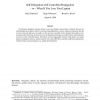Free Online Productivity Tools
i2Speak
i2Symbol
i2OCR
iTex2Img
iWeb2Print
iWeb2Shot
i2Type
iPdf2Split
iPdf2Merge
i2Bopomofo
i2Arabic
i2Style
i2Image
i2PDF
iLatex2Rtf
Sci2ools
CRYPTO
1998
Springer
1998
Springer
Self-Delegation with Controlled Propagation - or - What If You Lose Your Laptop
We introduce delegation schemes wherein a user may delegate certain rights to himself, but may not safely delegate these rights to others. In our motivating application, a user has a primary (long-term) key that receives some personalized access rights, yet the user may reasonably wish to delegate these rights to new secondary(short-term) keys he createsto useon his laptop whentraveling, to avoid having to store his primary secret key on the vulnerable laptop. We propose several cryptographic schemes, both generic ones under general assumptions and more specific practical ones, that fulfill these somewhat conflicting requirements, without relying on special-purpose (e.g., tamper-proof) hardware.
| Added | 05 Aug 2010 |
| Updated | 05 Aug 2010 |
| Type | Conference |
| Year | 1998 |
| Where | CRYPTO |
| Authors | Oded Goldreich, Birgit Pfitzmann, Ronald L. Rivest |
Comments (0)

